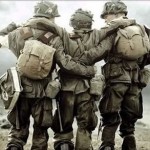"Band of Brothers" Commander Dies
 Every day, we lose more and more men from the citizen army that faced and defeated Nazi Germany in World War II.
Every day, we lose more and more men from the citizen army that faced and defeated Nazi Germany in World War II.
On the night of June 5-6, 1944, a group of young men—boys many of them—embarked on an extraordinary mission. Hunched in the dark cabins against the sides of their C-47s and contemplating what fate had in store for them in enemy country below them, they were the vanguard of the greatest invasion fleet the world had ever seen which was at that moment bearing down on the Normandy coast and Adolf Hitler’s ‘Fortress Europe.” Their mission was to parachute behind the German lines and sow as much chaos and confusion as they could while completing their assigned tasks aimed at securing the beachhead from which the Allies would, in Eisenhower’s words:
Enter the continent of Europe and, in conjunction with the other Allied Nations, undertake operations aimed at the heart of Germany and the destruction of her Armed Forces.
The men who fought that great crusade are now old and gray and starting to die off at an accelerated rate. One such man to pass away this week following a lengthy illness was Retired Army Maj. Richard “Dick” Winters, whose exploits as leader of “Easy” Company, 2nd Battalion, 506th Parachute Infantry, 101st Airborne Division and later battalion commander were made famous in the TV movie Band of Brothers (based on the Stephen Ambrose book of the same title). The Major had been a familiar face to both historians and fans of the series alike and became an iconic image of America’s role in liberating Western Europe from the Nazis.
Winters himself shied away from the notion that his experiences were somehow unique and would consistently deflect attention away from himself and towards his men. They in turn unanimously remembered Winters as a truly gifted officer in a citizen army in which many were handed the responsibility of command but not all rose to the daunting challenge of leading men in battle. One of Winters’ men, Joe Lesniewski of Erie, summed up the feelings of those who served under him: "Every one of us, we'd follow him to hell. That's the type of guy he was."
Maj. Winters served bravely in every one of the 101st’s campaigns in Europe starting on D-Day and careening through Operation Market-Garden (the “Bridge Too Far” operation), the storied defense of Bastogne during The Battle Of The Bulge, and into Germany itself, even taking over Hitler’s fabled Bavarian retreat, The Eagle’s Nest. Winters was awarded the Distinguished Service Cross, our nation’s second highest honor, for his exploits leading an ad hoc group of scattered parachutists in destroying German battery emplacements firing on the landings at Utah Beach. In 2007, the mayor of Eindhoven, Holland presented him with the Medal of the City for his unit’s part in liberating the town from the Germans in September 1944.
After the war Winters retreated to a more quiet life, maintaining a farm outside Hershey, PA where he became a successful businessman. He was often sought out for his leadership insights.
Although there was a movement to award him the Medal Of Honor, our country's highest decoration, Winters himself never pushed for it. This would come as no surprise to those who served with him, for it was always about the men. Nor would it seem out of character to Steven Spielberg, Tom Hanks or any of those involved in HBO’s $125 million Emmy Award winning series who got to know the man and provide him and his comrades in arms the venue of personal reflections through which to tell their story. The last scene of the last episode shows Winters himself, long retired with a face gouged by the passage of time, a soothing voice, thinning gray hair, and eyes that reflected upon past images that I cannot begin to fathom. When his grandchild asked him if he was a hero in the war, Winters replied, choking back tears: “No…but I served in the company of heroes.”
Dick Winters was 92. God speed. You were a better man than I, sir.